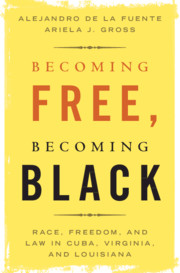(Source: CUP)
Cambridge
University Press is publishing a new book on Race, Freedom, and the Law in
Cuba, Virginia, and Louisiana.
ABOUT THE
BOOK
How did Africans
become 'blacks' in the Americas? Becoming Free, Becoming Black tells the story
of enslaved and free people of color who used the law to claim freedom and
citizenship for themselves and their loved ones. Their communities challenged slaveholders'
efforts to make blackness synonymous with slavery. Looking closely at three
slave societies - Cuba, Virginia, and Louisiana - Alejandro de la Fuente and
Ariela J. Gross demonstrate that the law of freedom - not slavery - established
the meaning of blackness in law. Contests over freedom determined whether and
how it was possible to move from slave to free status, and whether claims to
citizenship would be tied to racial identity. Laws regulating the lives and
institutions of free people of color created the boundaries between black and
white, the rights reserved to white people, and the degradations imposed only
on black people.
ABOUT THE
AUTHORS
Alejandro de la Fuente, Harvard University,
Massachusetts
Alejandro de la Fuente is the Robert Woods Bliss Professor of Latin American History and Economics, Professor of African and African American Studies, and the Director of the Afro-Latin American Research Institute at Harvard University, Massachusetts. He is the author of Diago: The Pasts of this Afro-Cuban Present (2018); Havana and the Atlantic in the Sixteenth Century (2008); and A Nation for All: Race, Inequality, and Politics in Twentieth-Century Cuba (2001).
Ariela J. Gross, University of Southern California
Ariela J. Gross is the John B. and Alice R. Sharp Professor of Law and History and the Co-Director of the Center for Law, History, and Culture at the University of Southern California Gould School of Law. She is the author of What Blood Won't Tell: A History of Race on Trial in America (2008) and Double Character: Slavery and Mastery in the Antebellum Southern Courtroom (2000).
TABLE OF
CONTENTS
Introduction
1. 'A Negro and by consequence an alien': local regulations and the making of race, 1500s–1700s
2. The 'inconvenience” of black freedom: manumission, 1500s–1700s
3. 'The natural right of all mankind': claiming freedom in the age of revolution, 1760s–1830
4. 'Rules … for their expulsion': foreclosing freedom, 1830s–1860
5. 'Not of the same blood': policing racial boundaries, 1830s–1860
Conclusion: 'Home-born citizens: the significance of free people of color.
1. 'A Negro and by consequence an alien': local regulations and the making of race, 1500s–1700s
2. The 'inconvenience” of black freedom: manumission, 1500s–1700s
3. 'The natural right of all mankind': claiming freedom in the age of revolution, 1760s–1830
4. 'Rules … for their expulsion': foreclosing freedom, 1830s–1860
5. 'Not of the same blood': policing racial boundaries, 1830s–1860
Conclusion: 'Home-born citizens: the significance of free people of color.
More info here


No comments:
Post a Comment